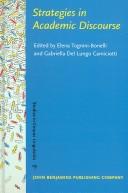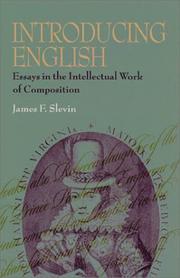| Listing 1 - 10 of 220 | << page >> |
Sort by
|
Book
ISBN: 0128130113 0128130105 9780128130117 9780128130100 Year: 2018 Publisher: London, England : Elsevier,
Abstract | Keywords | Export | Availability | Bookmark
 Loading...
Loading...Choose an application
- Reference Manager
- EndNote
- RefWorks (Direct export to RefWorks)
Academic writing. --- Learned writing --- Scholarly writing --- Authorship
Book
ISBN: 1602353433 160235345X 1602353468 Year: 2012 Publisher: Anderson, South Carolina : Parlor Press, LLC,
Abstract | Keywords | Export | Availability | Bookmark
 Loading...
Loading...Choose an application
- Reference Manager
- EndNote
- RefWorks (Direct export to RefWorks)
Emerging from the International WAC/WID Mapping Project, this collection of essays is meant to inform decision-making by teachers, program managers, and college/university administrators considering how writing can most appropriately be defined, managed, funded, and taught in the places where they work. Writing Programs Worldwide offers an important global perspective to the growing research literature in the shaping of writing programs. The authors of its program profiles show how innovators at a diverse range of universities on six continents have dealt creatively over many years with day-to-day and long-range issues affecting how students across disciplines and languages grow as communicators and learners. In these profiles, we see teachers and researchers relying on colleagues and on transnational scholarship to build initiatives that are both well suited to their specific environments and can serve as regional and often global models. Their struggles and achievements offer insights to colleagues in similar locales and across borders who seek to establish, enhance, and assess their own work as designers of writing programs. An introduction and three section essays by the editors illuminate themes that inform this collection. Growing networks of initiators and scholars and survey results from the International WAC/WID Mapping Project exemplify the argument of this collection for transnational exchange and collaboration.
Academic writing --- Learned writing --- Scholarly writing --- Authorship
Book
ISBN: 1443864323 9781443864329 1306992370 9781306992374 1443850543 9781443850544 Year: 2013 Publisher: Newcastle upon Tyne : Cambridge Scholars Publishing,
Abstract | Keywords | Export | Availability | Bookmark
 Loading...
Loading...Choose an application
- Reference Manager
- EndNote
- RefWorks (Direct export to RefWorks)
Academic writing. --- Learned writing --- Scholarly writing --- Authorship
Book
ISBN: 9783031065194 Year: 2022 Publisher: Cham Springer International Publishing :Imprint: Palgrave Macmillan
Abstract | Keywords | Export | Availability | Bookmark
 Loading...
Loading...Choose an application
- Reference Manager
- EndNote
- RefWorks (Direct export to RefWorks)
Academic writing. --- Learned writing --- Scholarly writing --- Authorship
Book
ISBN: 9781733484602 1733484604 Year: 2019 Publisher: S l. [Barbara W. Sarnecka]
Abstract | Keywords | Export | Availability | Bookmark
 Loading...
Loading...Choose an application
- Reference Manager
- EndNote
- RefWorks (Direct export to RefWorks)
Research is all about writing, but most PhD programs don't teach students how to produce the writing needed to get a PhD, publish research, or win fellowships and grants. Plus, the academic environment can feel as cold and harsh as the South Pole. But just as penguins form social huddles to survive the Antarctic winter, researchers can form writing groups to help them learn how to write more, write better and be happier in academia. The Writing Workshop tells you everything you need to know about forming and running a successful writing group, and provides invaluable tips on how to become better at and more comfortable with academic writing. Written by a professor of Cognitive Sciences at the University of California, this friendly guide is aimed at early-career researchers such as PhD students, postdoctoral scholars and new faculty members. Chapter topics include: How to form and run a writing workshop; how to plan research and writing projects over the long (one to five years), medium (ten to fifteen weeks), and short (one week) terms; how to establish and maintain a regular daily(ish) writing practice; how to write a literature review, research article, funding proposal or presentation; and how to revise for clarity at the document, paragraph, sentence and word levels. There are templates to help students set writing goals and log their writing practice, plus in-class exercises to help writers learn to hear the difference between effective and ineffective writing. Running through the book is the theme of well-being, and the idea that creativity comes from self-compassion rather than self-punishment. Writing is not only a way of producing scholarly output, but also a way of thinking, learning and generating new ideas. A regular writing practice grounded in a supportive community is something that every early-career scholar deserves and, with this book, it's something every early-career scholar can have.
Academic writing --- Learned writing --- Scholarly writing --- Authorship
Book
ISBN: 0385123809 9780385123808 Year: 1977 Publisher: Garden City Doubleday
Abstract | Keywords | Export | Availability | Bookmark
 Loading...
Loading...Choose an application
- Reference Manager
- EndNote
- RefWorks (Direct export to RefWorks)
Academic writing. --- Academic writing --- Learned writing --- Scholarly writing --- Authorship
Book
ISBN: 1607092948 9786613927934 1283615487 9781607092940 9781607092926 1607092921 9781607092933 160709293X Year: 2010 Publisher: [Manassas Park, Va.] Lanham, Md. Association of Teacher Educators Rowman & Littlefield Education
Abstract | Keywords | Export | Availability | Bookmark
 Loading...
Loading...Choose an application
- Reference Manager
- EndNote
- RefWorks (Direct export to RefWorks)
The Little Book provides succinct questions and invites pauses for reflections, designed to focus and expedite the research process so that your research experience will be rewarding and provide pathways for future research endeavors.
Research --- Academic writing. --- Learned writing --- Scholarly writing --- Authorship --- Methodology.
Book
ISBN: 1443882372 9781443882378 9781443878012 1443878014 Year: 2015 Publisher: Newcastle upon Tyne, UK
Abstract | Keywords | Export | Availability | Bookmark
 Loading...
Loading...Choose an application
- Reference Manager
- EndNote
- RefWorks (Direct export to RefWorks)
Academic discourse has recently become a blooming field of research for linguists interested in genre and discourse analysis, as well as pragmatics. The methodology and conventions employed in academic discourse, however, vary across cultures to a certain degree, and often represent obstacles for publishing in international journals for authors whose native language is not English, as top journals tend to centre on the Anglo-Saxon academic writing norms. This is one of the major reasons why national academic discourses need to be linguistically profiled and studied and contrastively compared a
Academic writing --- Academic writing. --- Learned writing --- Scholarly writing --- Authorship

ISBN: 9027222908 9786612156243 1282156241 9027293953 9789027293954 9789027222909 Year: 2005 Publisher: Amsterdam Philadelphia J. Benjamins
Abstract | Keywords | Export | Availability | Bookmark
 Loading...
Loading...Choose an application
- Reference Manager
- EndNote
- RefWorks (Direct export to RefWorks)
This book focuses on theoretical and descriptive issues and techniques in the study of text and discourse. Drawing on a large number of corpora containing academic language, from spoken language to published research papers, the authors approach their subject from multiple angles: The academic language of biology, literature, philosophy, economics, agriculture, linguistics and applied linguistics. The analysis of intertextual features these papers show leads to penetrating results.
Academic writing --- Discourse analysis --- #KVHA:Taalkunde --- #KVHA:Academische taal --- Learned writing --- Scholarly writing --- Authorship

ISBN: 0822972263 0822941511 0822957523 9780822972266 9780822941514 9780822957522 Year: 2001 Publisher: Pittsburgh, Pennsylvania
Abstract | Keywords | Export | Availability | Bookmark
 Loading...
Loading...Choose an application
- Reference Manager
- EndNote
- RefWorks (Direct export to RefWorks)
English language --- Academic writing --- Rhetoric --- Study and teaching --- Learned writing --- Scholarly writing --- Authorship --- Germanic languages
| Listing 1 - 10 of 220 | << page >> |
Sort by
|

 Search
Search Feedback
Feedback About UniCat
About UniCat  Help
Help News
News